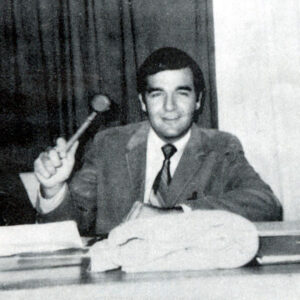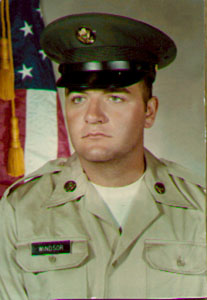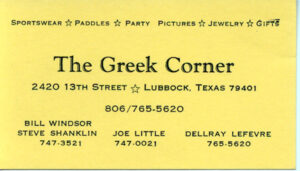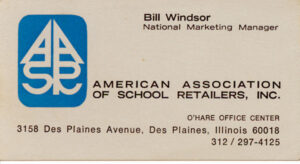
As a college student at Texas Tech University, William Windsor was working as a DJ at KCAS-Radio in Slaton, Texas and KLVT-Radio in Levelland, Texas. He was working 30 to 40 hours a week and paying most of his college expenses.

Bill was President of Delta Tau Delta fraternity at Texas Tech. He was also Vice-President of the Interfraternity Council. A traveling salesman came to Lubbock and took orders for fraternity and sorority sportswear with 50% deposits. The balances were to be paid on delivery. The salesman was a crook, and he stole the money from the Tech kids.
This was discussed at the IFC meeting, and the fraternity presidents voted to require salespeople to register and go through an approval process before they could sell. Fraternity members and pledges were told to call the president of their fraternity if they encountered anyone trying to sell on campus.
Bill Windsor was at his apartment one Sunday and the phone rang. It was a Delt pledge reporting that a man was in the dorm trying to sell fraternity sportswear. Bill spoke to Ken Miller of Southern Sportswear that he would not be able to sell until he was approved, which could take a month. It’s about a six-hour drive to Lubbock from civilization, so Ken was understandably disappointed. He asked if he could come over to talk to Bill.
Ken came to Bill’s apartment and brought his samples. He had a great line that included some cool surfer-type shirts that Bill had never seen before. Ken asked Bill whether the problem was that kids couldn’t be sure they would get their merchandise and could lose their deposits. Yep. Ken asked, “what if all orders came in COD with a personal check accepted on delivery?” Bill said that would work as they could stop payment if the merchandise was not received or was unacceptable, but he’d still need approval.
Ken asked, “Well, what if you were my campus representative? I could ship to you and accept your personal check. I’ll pay you 15% commission.”
That got Bill’s entrepreneurial juices flowing. He said, “I’ll give it a try.” Ken left a set of samples with Bill, order forms, and complete information. Bill felt very comfortable with Ken Miller from Atlanta, Georgia. Business #2 (lemonade stand was #1 LOL.)
Bill took the samples down to his fraternity meeting, put them in the living room with order forms. After the meeting ended, he had orders for $1,000 and checks for $1,000. He made $150 doing little or nothing. He thus started his first business with no money and had $150 in working capital.
He mailed the order off to Ken Miller. Three weeks later, he received a COD for $850. He wrote a check, and his fraternity brothers were delighted. He got orders for another $1,000 when all the fraternity brothers saw the stuff. Cha-ching, another $150.
Bill kept working as a disc jockey, and he was making $450 or so a week selling fraternity and sorority sportswear. The sororities had Bill come to their meetings at least once a month. Tough duty. LOL.
Bill couldn’t get around to see the sororities as often as they would have liked, and he never had time to go to any of the fraternity meetings. He had also added party favors, mugs, greek jewelry, and more.
 In 1970, Bill joined the United States Army Reserves. His best friend, Steve Shanklin, handled the business while Bill was in the Army.
In 1970, Bill joined the United States Army Reserves. His best friend, Steve Shanklin, handled the business while Bill was in the Army.

So, after he returned from active duty in the U.S. Army, William M. Windsor decided to open a store. The business was called University Services, and the fraternity-sorority business was called The Greek Corner. The rent was scary – $75 a month. But he signed a lease and then subleased part of the store to other entrepreneurs. He made a profit as a landlord. Business #3. The store was pretty ugly, but it was just half a block to the Texas Tech campus. Bill quit working as a DJ when he opened his store.
When one of his tenants was thrown in jail for stealing a piece of beef jerky at the 7-11, Bill became upset when Joe had to spend the night in jail. None of the bail bond companies would come to bail him out at midnight. So Bill worked with Bill Goodacre to start a bail bond service for students.

Bill got 20,000 red and black business cards, one for each student at Texas Tech, and he started handing them out. For the next two years, he spent many Friday and Saturday nights down at the Lubbock County Jail to get students out. The bond fee is generally 10@, but he gave students a 10% discount, so it cost them 9%. Business #4.

Bill’s girlfriend, Barbara, had a sister who could get factory-outlet double-knit slacks, popular at the time. Bill started buying them from Judy, and he put them in his store and sold a lot of slacks at $12 to $15.
Bill Windsor was THE best-known student entrepreneur at Texas Tech. So, other companies contacted him to sell things for them and do projects for them. Bill established a rep business to handle other types of work. He made a fortune soliciting students to obtain a Humble (Exxon) credit card. He also did projects for Playboy Magazine (Sex on the College Campus study), Great Books, and others. Business #5.
College Marketing Research gave Bill a contract to travel throughout Texas to find and hire other student entrepreneurs to solicit credit card applications. Bill received 10 cents a card for every application they obtained.
Bill was accepted to law school, but he was also preparing to marry Barbara. He decided he didn’t want to spend two years studying night and day. He enjoyed making money, so he interviewed. He received an offer from Procter & Gamble, but he chose an unknown company that had the concept of doing nationwide what Bill had done in Lubbock.

Bill took a huge pay cut when he accepted the position of National Marketing Manager for the American Association of School Retailers. When Bill graduated from Texas Tech, he sold the businesses to his best friend, Steve Shanklin.

P.S. This is a photo of the store after a tornado ripped Lubbock. Our signage was destroyed.